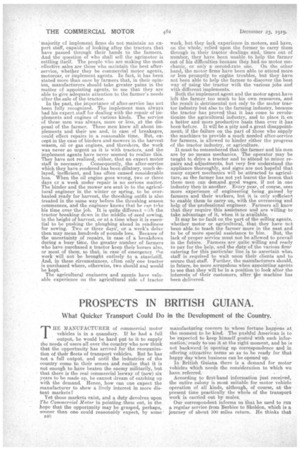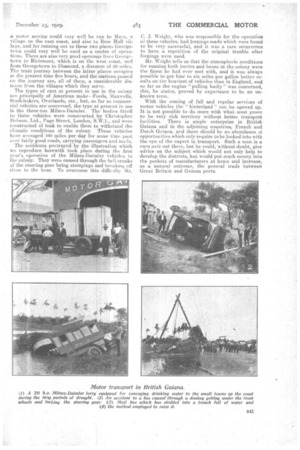PROSPECTS IN BRITISH GUIANA.
Page 18

Page 19

If you've noticed an error in this article please click here to report it so we can fix it.
What Quicker Transport Could Do in the Development of the Country.
THE XIANUFACTURER of commercial motor , vehicles is in a quandary. If he had a full output, he would be hard put to it to supply the needs of users all over the country who now think that the opportunity has arrived for the reorganization of their fleets of transport vehicles. But he has not a full output. and until the industries of the country come to their senses and realize that it is not enough to have beaten the enemy militarily, but that there is the real commercial leeway of (now) six years to be made up. he cannot dream of catching up with the demand. Hence, how can one expect the manufacturer to show 6 lively interest in more distant markets I Yet those markets exist, and a duty devolves upon The Commercial Motor in pointing them out, in the hope that the opportunity may be grasped, perhaps, sooner than one could reasonably expect, by some
nt0
manufacturing concern to whom fortune happens at the moment to be kind. The pushful American is to be -expected to keep himself posted with such information, ready to use it at the right moment, and he is not backward in opening up correspondence and in offering attractive terms so as to be ready for that happy day when business can be opened up.
. In British Guiana there is a demand for motor vehicles which needs the consideration to which we have referred.
According to first-hand information just received, the entire colony is most suitable for motor vehicle operation of all kinds, although, of course, at the present time practically the whole of the transport work is. carried out by mules.
Our correspondent informs us that he used to run a regular service from Berbiee to Skeldon, which is a journey of about 100 miles return. He thinks that a motor service could very well be run to Mara, a village on the east coast, and also to Rose Hall village, and for running out to these two places Georgetown could very well be used as a centre of operations. There are also very good openings from Georgetown to Blsirmont, which is on the west coast, and from Georgetown to Diamond, a distance of 59 miles. The train journey between the latter places occupies at the present time five hours, and the stations passed on the journey are, all of them, a c,onsiderable distance from the villages which they serve.
The types of cars at present in use in the colony are principally of American make—Fords, Maxwells, Studebakers, Overlands, etc., but, so far as commercial vehicles-are-concerned, the type at present in use is the three-ton Milnes-Dairuler. The bodies fitted to these vehicles were •constructed by Christopher Dobson, Ltd., Page Street, London, &W.I., and were constructed of teak to enable them to withstand the climatic conditions of the colony. These vehicles have averaged 1.00 miles per day for so-me time past over fairly good roads, carrying passengers and mails.
The accidents portrayed by the illustration which we reproduce herewith took place during the first year's operation of the Milnes-Daimler vehicles in the colony. They were caused through the bell-cranks of the steering gear being stampings and breaking ell close to the boss. To overcome this difficulty Mr. C. J. Wright, who was responsible for the operation of these vehicles, had forgings made which were found to be very successful, and it was a rare occurrence to have a repetition of the original trouble after forgings were used.
Mr. Wright tells us that the atmospheric conditions for running both lorries and buses in the colony were the finest he had ever met with, and it wasalways possible to get. four to six miles per gallon better results on the heaviest of vehicles than in England, and so far as the engine "pulling badly" was concerned, this, he states, proved by experience to be an unknown term.
With the coming of full and regular servk-es of motor vehicles the " hinterland " can be opened up. It is not possible to do more with what must prove to be very rich territory without better transport facilities. There is aMple e.nti3rprize in British Guiana and in the adjoining countries, French and Dutch Guiana„ and there should be an abundance of opportunities which only require to be looked into with the eye of the expert in transport. Such a man is a rara avis out there, but he could, without doubt, give advice on the subject which would not only help to develop the districts, but would put much money. into the pockets of manufacturers at home and increase, as a natural outcome, the general trade between Great Britain and Guiana ports.


























